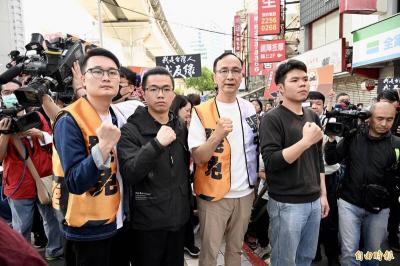The Green Party Taiwan and Social Democratic Party (SDP) yesterday said they would register a “Green-SDP Alliance” party with the Ministry of the Interior to field a joint slate of at-large candidates in January’s legislative elections.
Green Party conveners Lee Ken-cheng (李根政) and Chang Yu-ching (張育憬) shook hands with SDP convener Fan Yun (范雲) at a press conference in Taipei after signing a memorandum of understanding.
Legislative candidates from the two parties stood together promising to “fight together to win for the people.”

Photo: Lo Pei-der, Taipei Times
“Compatriots must stand together, because true strength is found in solidarity,” Lee and Fan Yun both said in their speeches at the event, quoting Taiwanese democracy pioneer Chiang Wei-shui (蔣渭水).
“Taiwan needs a new political force aside from two main political parties, which are both biased towards corporations — a political force that would always stand up to defend land, the weak and human rights,” Lee said. “The Green-SDP Alliance will act as a watchdog and an opposition party.”
While negotiating cooperation had been “difficult,” requiring six months of talks, solidarity was important to both sides, he said.
Fan said the alliance would work to “eliminate” the Chinese Nationalist Party (KMT) while “balancing” the Democratic Progressive Party by striving to become the “crucial minority” in the Legislative Yuan.
She urged other “progressive social forces” to stand with them in the legislative elections, saying the alliance’s current membership was “insufficient.”
The Green Party Taiwan was founded in 1996 and won two county and city councilor seats in last year’s local elections.
The Social Democratic Party was founded by members of the civic group Taiwan Citizen’s Union (TCU) in March, following disagreements with TCU members who had launched the New Power Party earlier in the year.
Efforts by the Green Party and New Power Party aimed at collaboration failed.
Lee said that while he remained open to “cooperation” with the New Power Party, registration deadlines would make it difficult to include that party in the alliance’s slate of at-large candidates after they officially register the ticket with the interior ministry.
Any cooperation would likely be limited to harmonizing candidates for legislative districts, he said.
“This is a temporary alliance created to participate in the elections,” said Ku Yu-ling (顧玉玲), a former secretary-general of the Taiwan International Workers’ Association, who was invited to witness the signing of the memorandum. “Exactly where they compromise and how they define the basis for their cooperation is very interesting and important.”
While the memorandum calls for joint campaigning and splitting any campaign contributions and subsidies, the two parties have not drafted a common platform or even drawn up a list of candidates.
Parties must attract 5 percent of the national vote to be eligible for an at-large legislative seat.
A report by the Chinese-language Storm Media on opinion polls released last week placed support for the New Power Party at 5.6 percent of respondents, the Green Party at 2.6 percent and the SDP at less than 1 percent.

The Ministry of Economic Affairs has fined Taobao NT$1.2 million (US$36,900) for advertisements that exceeded its approved business scope and ordered the Chinese e-commerce platform to make corrections in the first half of this year or its license would be revoked. Lawmakers have called for stricter supervision of Chinese e-commerce platforms and more stringent measures to prevent China from laundering its goods through Taiwan as US President Donald Trump’s administration cracks down on origin laundering. The legislature’s Finance Committee yesterday met to discuss policies to prevent China from dumping goods in Taiwan, inviting government agencies to report on the matter. Democratic Progressive Party

Taiwan and its Pacific ally Tuvalu on Tuesday signed two accords aimed at facilitating bilateral cooperation on labor affairs, according to Taiwan’s Ministry of Foreign Affairs (MOFA). The governments inked two agreements in Taipei, witnessed by Foreign Minister Lin Chia-lung (林佳龍) and visiting Deputy Tuvaluan Prime Minister Panapasi Nelesone, MOFA said in a news release. According to MOFA, the agreements will facilitate cooperation on labor issues and allow the two sides to mutually recognize seafarers’ certificates and related training. Taiwan would also continue to collaborate with Tuvalu across various fields to promote economic prosperity as well as the well-being of their

Taiwan would welcome the return of Honduras as a diplomatic ally if its next president decides to make such a move, Minister of Foreign Affairs Lin Chia-lung (林佳龍) said yesterday. “Of course, we would welcome Honduras if they want to restore diplomatic ties with Taiwan after their elections,” Lin said at a meeting of the legislature’s Foreign Affairs and National Defense Committee, when asked to comment on statements made by two of the three Honduran presidential candidates during the presidential campaign in the Central American country. Taiwan is paying close attention to the region as a whole in the wake of a

The Taipei District Prosecutors’ Office has continued its investigation into allegations of forged signatures in recall efforts today by searching the Chinese Nationalist Party’s (KMT) city chapter and questioning several personnel including the chapter director, according to media reports. Among those questioned and detained were KMT Taipei chapter director Huang Lu Chin-ju (黃呂錦茹), chapter secretary-general Chu Wen-ching (初文卿), chapter secretary Yao Fu-wen (姚富文) and first district committee executive director Tseng Fan-chuan (曾繁川). Prosecutors said they would not confirm reports about who had been summoned. The investigation centers on allegations that the ongoing recall campaigns targeting Democratic Progressive Party legislators Rosalia Wu (吳思瑤)